2023 Nobel Prize Summit: Truth, Trust, and Hope: Proceedings of a Summit (2023)
Chapter: 5 EXTENDING THE CONVERSATION: THE FORUM OF EXPERTS
5
TRUTH, TRUST, AND HOPE
EXTENDING THE CONVERSATION
THE FORUM OF EXPERTS
The second day of the summit (May 25, 2023) involved more than 200 individuals from a range of disciplines, including technology, public health, journalism, and activism, and across sectors, including academia, business, civil society, government, and media. Maia Mazurkiewicz and Omri Preiss (Alliance4Europe) served as moderators. In launching the day, Preiss
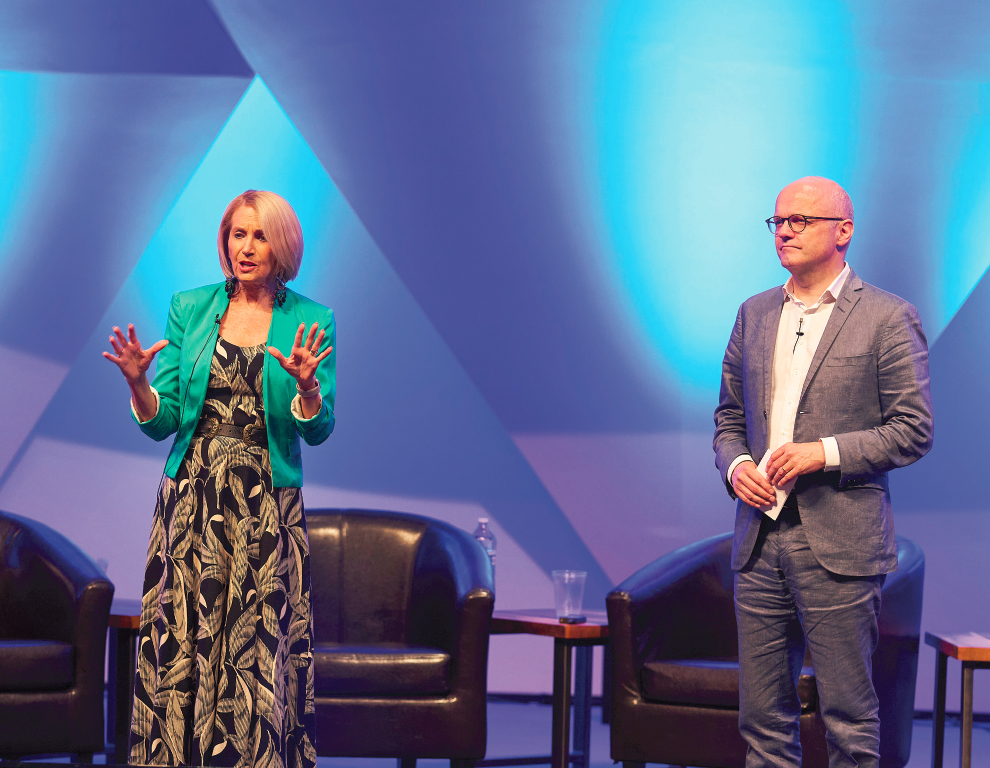
noted, “This is a crucial time to be dealing with tech and democracy issues and how society moves ahead. With all the talent and capacities in the room, we’ll be able to drill down to how we move from problem to solution.” Mazurkiewicz stressed the power gained from collective thought and action.
Leaders from the two convening organizations welcomed the participants. Marcia McNutt, president of the National Academy of Sciences (NAS), shared some takeaways from the first day of the summit. She noted that one topic that came up frequently was social media’s incentive systems, and particularly the perverse incentives that spread mis- and disinformation. Ideas to counter these incentives may be imposing a “duty of care for democracy” on tech companies so they are beholden not just to shareholders but to democratic principles. Another issue that she took from that day’s Global Conversation was the need
for scientists to relate to communities. Scientists should not impose outcomes, she underscored, but they can work with policymakers. To Vidar Helgesen, executive director of the Nobel Foundation, collaboratively drilling down on issues among scientists, civil society, business leaders, and decision-makers is an example of what needs to happen.
The in-person event consisted of three panel discussions, a breakout session, and a final return to a plenary session.
COLLABORATION AMID COMPLEXITY
The first panel focused on how to build a global information environment that promotes human progress and collaboration. Moderated by Sheldon Himelfarb, the session began with a recorded message from Nobel Prize laureate and activist Tawakkol Karman, followed by a discussion with John Momoh (Channels Broadcasting, Nigeria), Sanjiv Ahuja (Tillman Global Holdings), and Melissa Fleming (United Nations).
THE DOUBLE-EDGED SWORD OF SOCIAL MEDIA
In her remarks, Karman commented that the summit title “Truth, Trust, and Hope” perfectly suits this moment in history. Collaboration can defeat disinformation and hate, she said. The information environment is a double-edged sword. Social media platforms have made information more accessible, which means that people can express their opinions and connect with others more easily. But these tools can be exploited by malicious actors to undermine elections, cause confusion, and take advantage of people. Authoritarian regimes can use them to maintain their grip on power and to silence voices, she said.
The Arab Spring in the early 2010s provided an example to see both sides of the technology. Social media was powerful in allowing for collective peaceful action and the will of the people to achieve freedom, justice, and democracy. Technology became a beacon of hope to ordinary citizens and served as a digital public square. But the dark side also came to light. Authoritarian regimes recognized the potential threat of social media and quickly adapted their tactics to maintain their grip on power and suppress dissent. They spread misinformation, embraced digital surveillance, deployed cyber armies, and enacted laws to limit discourse. False stories were spread about peaceful opponents, activists, women, journalists, and others.
“I believe we can overcome the obstacles and challenges if we cooperate and work together. We can safeguard the truth and protect the people’s voices and integrity of digital spaces. Global democracies, tech companies, and civil society must join forces to support the voices of those who strive for freedom, democracy, dignity, and human rights,” Karman concluded.1
COLLABORATION CHALLENGES AND OPPORTUNITIES
Expounding on the United Nations Code of Conduct that she discussed earlier (see Chapter 3), Fleming explained the UN takes on a lot of herculean tasks and is finding that “we cannot achieve these goals in toxic information environments.” Independent media has been threatened, with news deserts in many local communities or even across whole regions or nations. What is
___________________
1 For a video of Karman’s full remarks, see https://www.youtube.com/watch?v=4POakJ95fDM&list=PLJE9r-mV1-0uD_jpBJp4oJLnitdZoyAcpI&index=2.
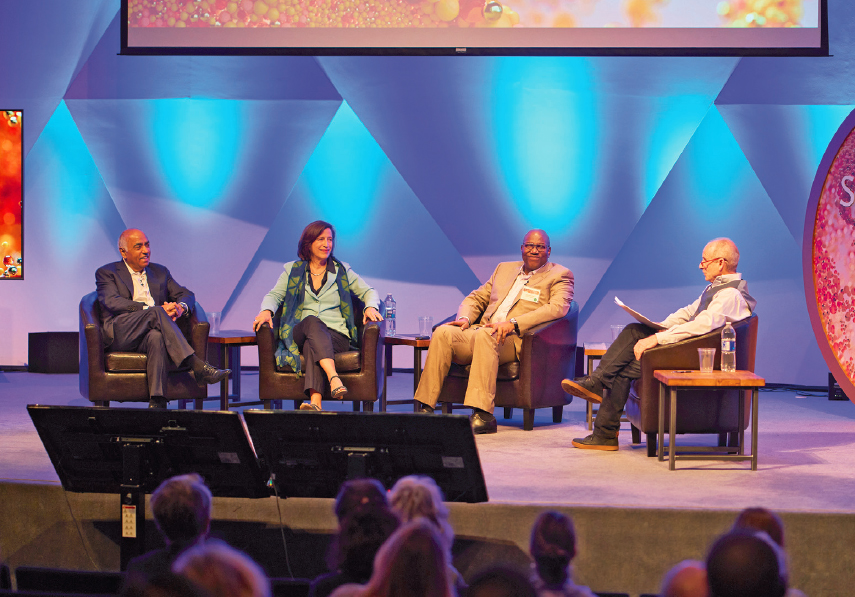
I believe we can overcome the obstacles and challenges if we cooperate and work together. We can safeguard the truth and protect the people’s voices and integrity of digital spaces. Global democracies, tech companies, and civil society must join forces to support the voices of those who strive for freedom, democracy, dignity, and human rights. —Tawakkol Karman
streamed in are free tools that are not necessarily used for the greater good, she noted. Social media has been useful to pull people together and fill news gaps. Citizen journalists play a role, but those voices are under attack. The UN itself and the work it is trying to do is being undermined. She explained that the UN Code of Conduct will set a gold standard, building on the UN’s moral authority. It will not be signed by member states, in part because the states are not the only ones who can solve the problem, but she expressed hope that it will be a standard-setting document.
Ahuja commented on the unprecedented pace of technology. In the early 20th century, he noted, journalism was not reliable but rather published to sell newspapers. At the time, reliable news organizations stepped up. Today, he said, civil society must step up. As urgent as climate change action is, he posited, it is on a slow burn relative to misinformation and its impact. In his view, the only way corporate actors will act is if civil society puts pressure on them. He said although not generally a believer in regulation, regulation with a light touch is needed in this situation. Collaboration with the technology sector is also part of the solution. Himelfarb observed that regulators and researchers need access to Big Tech’s algorithms and data, but the companies have managed to resist these efforts. To break the stalemate, Ahuja emphasized the need for a range of stakeholders (not just shareholders interested in value creation) to exert pressure. The information collected is from civil society, he observed, and civil society and academics should demand transparency.
Momoh, who has built the largest independent news media organization in Nigeria, used the country’s 2023 election as a case study. It was relatively peaceful, despite major socioeconomic issues and massive efforts to use mis- and disinformation. Many predicted that the election would have problems, but
civil society stepped up to collaborate with the government and media, especially when the results were not transmitted as quickly as expected. There is a need for more collaboration across sectors, as shown in Nigeria, Momoh stressed. The country is polarized, as is also seen in the United States and other countries.
In looking for models for collaboration, Fleming described the Intergovernmental Panel on Climate Change (IPCC) launched by the United Nations Environmental Programme and World Meteorological Organization. An IPCC secretariat selects the scientists who are involved, and they develop consensus science around climate change. There are many attempts to discredit it, and these disinformation efforts are very well funded, she noted. Although the process to fight climate change is slow, she posited that it would be slower without the IPCC, which has shown that climate change is undeniable.
Ahuja returned to the need to act now, especially with advances in artificial intelligence (AI) that will narrow the gap between the “facts” and “generated facts.” He stressed, “The overall challenges facing us are accelerating at an exponential rate. Government, industry, and civil society cooperation are critical. We should be creating norms and regulations, with pressure to demand openness of the data and algorithms. Otherwise, without transparency, the problems will get worse,” he concluded.
OVERCOMING HEALTH MISINFORMATION THROUGH BEHAVIORAL SCIENCE
Economic sciences laureate Paul Romer (New York University), Rachel Glennerster (University of Chicago), Eileen O’Connor (Rockefeller Foundation), Sylvie Briand (WHO Emergency Programme), Alonzo Plough (Robert Wood Johnson Foundation [RWJF]), and Robert Califf (U.S. Food and Drug Administration [FDA]) all work to improve health in different ways. They offered views about how to counter misinformation in a discussion moderated by Abdul El-Sayed (Communicator and Policymaker).
In introducing the panel, El-Sayed noted the panelists represent a diversity of perspectives, which he said is critical after the global pandemic. “We were held hostage not just by a virus but by our incapacity to share a narrative about what that virus is and how to address it,” he said. He asked the panelists what changes they have seen.
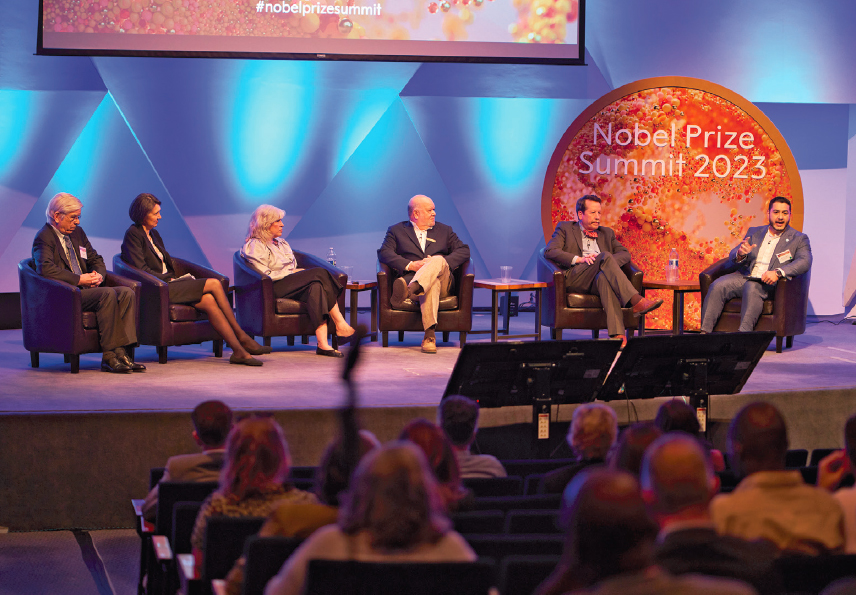
Califf said the foundations of communication have not changed. People are susceptible to chicanery, which is one of the reasons the FDA was created in the early 20th century. What has changed, he said, is the ubiquity of this chicanery because of the internet and a weakening of confidence in institutions that was taken for granted in the past.
Romer shared that one of the most important lessons from economics is when people come together and pursue self-interest, which may lead to good outcomes or bad outcomes. Society must act through governments to structure outcomes. “We need to stop apologizing about regulation. Regulation is law. It is the only thing that protects us from the abyss,” he underscored. “We have to stop thinking of the government as ‘someone else.’” Referring to an inaccurate article about vaccine boosters published in The Lancet, he noted that social media increased its prominence. With these situations, “the survival of the scientific revolution is at stake,” he warned.
O’Connor called out the role of emotion in tech companies’ algorithms. “We know their algorithms favor emotion. People click on emotion—things that create fear, things that create us-versus-them is what people click on. It gets in front of more and more eyeballs, and becomes believed. As known with propaganda, the more you say it, the more people will believe it is true,” she said. Social media also places people in information silos, which makes them more tribal. Research shows that even highly educated people will use and pick facts that agree with more emotional arguments. With COVID-19, this information ecosystem killed people, she said. She concurred that the ubiquity and monetization of information are two big changes, and companies make money off of people’s clicks. Investments should be made in algorithms that favor objective facts over emotions. With this goal in mind, the Rockefeller Foundation, Robert Wood Johnson Foundation, and others have invested in the Mercury Project to arm public health officials and community leaders with ways to counteract disinformation and work with

You cannot just drop in with data in the midst of an emergency. The community-up component of building trust is needed.” —Alonzo Plough
influencers.2 In addition to COVID-19, she pointed to climate change as another area that is heavily funded by those who seek to sow disinformation.
Briand said the World Health Organization (WHO) has also experienced the speed of information and the fact that people are overwhelmed with the amount of information that they do not know what to believe. Social science is needed to understand how people share information, including misinformation. In this noisy world, if their trusted sources are not providing the right information in the right format, people will go to other sources. She suggested that a positive role for AI is to develop social listening tools to understand people’s questions and concerns, and WHO is experimenting with the Early AI-supported Response with Social Listening, or EARS, tool.3
Plough also talked about the need for translational science about communication. Reflecting on his own background in public health, he said it is hard for science to “go retail,” but he stressed that misinformation and disinformation are social determinants of health that are as important as housing, water, and other determinants. They operate as contagions during emergencies and also chronically. For this reason, RWJF is supporting the Mercury Project and other projects. Plough commented that during the pandemic, he was often interviewed on talk radio and on Fox affiliates, and realized he needed both his science skills and his people skills.
Glennerster, a Mercury Project grantee, pointed to a body of science about how to communicate science using randomized control trials. She noted that her own work in West Africa draws on this body of research and then shared a few insights. Health information must fill in gaps, but many public health campaigns do not start by understanding what people do not know or what they are concerned about. Information should be actionable and come from a trusted source. Entertainment and humor can be important. She highlighted a project with a media company to develop a science-based radio campaign for family
___________________
2 For more information on the Mercury Project, see https://www.ssrc.org/programs/the-mercury-project.
3 For more information on EARS, see https://www.who-ears.com.
planning. The trial was randomized by radio station (which stations ran the program) and also by women who did or did not receive a radio. Large changes in beliefs and practices were seen, she reported. “I’m here to provide the hope that we can change long-held views and misperceptions about science, but we have to follow the science of how to convey science,” she said. O’Connor concurred that there is a lot of research to apply, but time is running out. Businesses also have to look down the road to see what they want societies to be like. If they share a vision for a free society and a free market, they have to take collective action and join with others.
Califf commented that tech companies are full of good people, but they are working for a machine that is producing an outcome that is hard to change. It is beyond the point where government alone can build trust. Scientists, clinicians, and others must spend part of every day building community, he said. FDA has a small budget for communications compared with tech companies and those spreading disinformation. He expressed hope that meetings like the summit lead to action. Plough observed that mis- and disinformation build on existing distrust in marginalized communities; disinformation is amplified and targeted to those communities. RWJF is funding work to build consistent community connection. “You cannot just drop in with data in the midst of an emergency,” he said. “The community-up component of building trust is needed.”
The panel agreed that AI learning models will present new challenges with the potential manipulation of images and text.4 “We need to address the essential piece of infrastructure called digital authenticity,” he recommended. Digital signatures and other tools exist, but few people are implementing them, and yet, he stressed, they are critical for protecting science and reputations. The scientific community must speak up, he said. Universities and academic centers should speak out more, Califf added. “We must be consistently teaching science and teaching scientists how to talk science.”
TRUTH + TRUST = HOPE
A panel of Nobel Prize laureates wrapped up the morning session. It consisted of Martin Chalfie (Columbia University), Richard Roberts (New England Biolabs),
___________________
4 The Defense Advanced Research Projects Agency has programs that focus on developing methods for detecting misinformation in text, images, video, and audio, including Media Forensics (MediFor) and Semantic Forensics (SemaFor). See https://www.darpa.mil/program/media-forensics and https://www.darpa.mil/program/semantic-forensics.
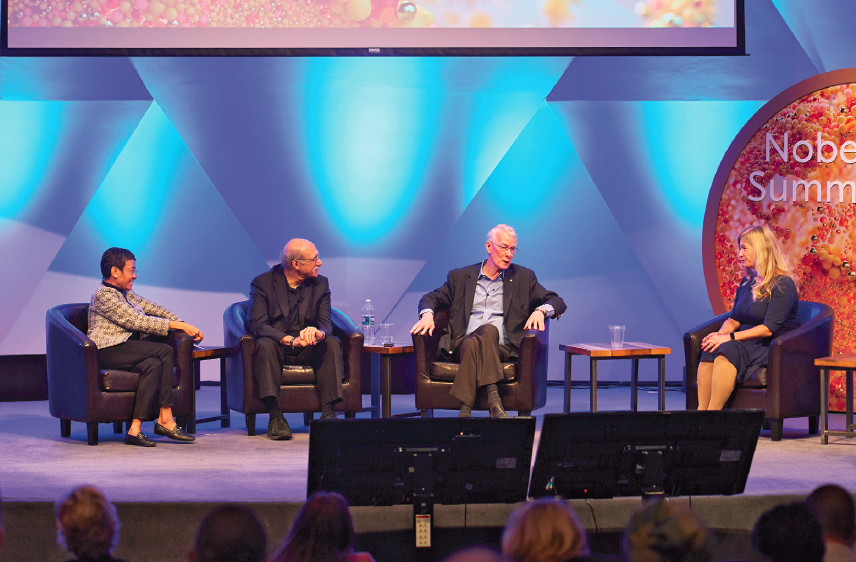
Maria Ressa (Rappler), and David MacMillan (Princeton University), and was moderated by Laura Lindenfeld (Stony Brook University), who discussed what scientists can do to generate trust. In her work training scientists in communications, she noted a comment from the center’s funder, actor Alan Alda, who said, what we are after is creating “a fairer, more just, more rational world.”5 Scientists must show up as human beings and connect what they are doing for society, she said.
Roberts said he was struck by previous comments that scientists stand up for how good science is for society. The problem, he said, is money. Scientists, whether in academia or other sectors, do not have the same access to funds to fight back. To that end, he related that he is involved in an effort in which scientific societies, universities, and others join and fight against attacks, and he invited participation.
___________________
5 See https://thewholestory.solutionsjournalism.org/building-a-better-j-school-at-stony-brook-university-cc6e6786ef99.
Chalfie added that people should be preparing for the next pandemic now. “How can we do better? If we wait, it is too late. We need to be building trust now, not just go from emergency to emergency.” Building on previous comments, he urged scientists to work locally with community journalists, organizers, and others. An unexpected benefit and opportunity of the Nobel Prize, he commented, is that in addition to speaking about his expertise, he is invited to talk more generally about science, to which the others agreed.
From her perspective as a journalist, Ressa added that part of the problem is the design of the technology. Journalists are only as good as their sources, built over years, and scientists are only as good as their minds and results. She quoted diplomat George Schultz, who said one of the things he learned as a statesman is with trust in the room, anything is possible; without trust, nothing is possible.6 She has learned the power of face-to-face interaction to develop trust, and she urged scientists to step up, but returned to the need to go to the core problem and fix the information ecosystem. “Why should lies and hate get the greatest distribution?” she posed.
MacMillan commented on the panel title—scientists, he commented, are focused on truth and always have hope. Trust has eroded as a result of disinformation, especially with the pandemic. Trust in scientists was always foundational, and watching it erode largely for political reasons has been very frustrating. “We spend too much time talking to each other,” he said, and instead urged scientists to transmit the value and joy of science to larger society. He also observed that younger scientists are better communicators than more established ones. Echoing the others, Roberts observed that the power of the Nobel Prize is people are more likely to listen to him and, if he is lucky, follow through with action. He has organized several campaigns with Nobel Prize laureates to spur others to act. Lindenfeld noted the power of leadership and inspiring others to listen.
Chalfie warned against false trust, including what might result from generative AI. Each version of AI is faster and more powerful exponentially. Ressa noted that when Rappler has been directly attacked, they have no rational defense against the intensity and asked why this should be allowed. Drawing on science and social network analysis, she noted that groups spread emotions, ideas, and
___________________
6 Paraphrased from text in Shultz, G. P. 2020. Life and Learning after One Hundred Years: Trust Is the Coin of the Realm: Reflections on Trust and Effective Relationships across a New Hinge of History. Available at https://www.hoover.org/sites/default/files/research/docs/shultz_finalfile_web-ready.pdf.
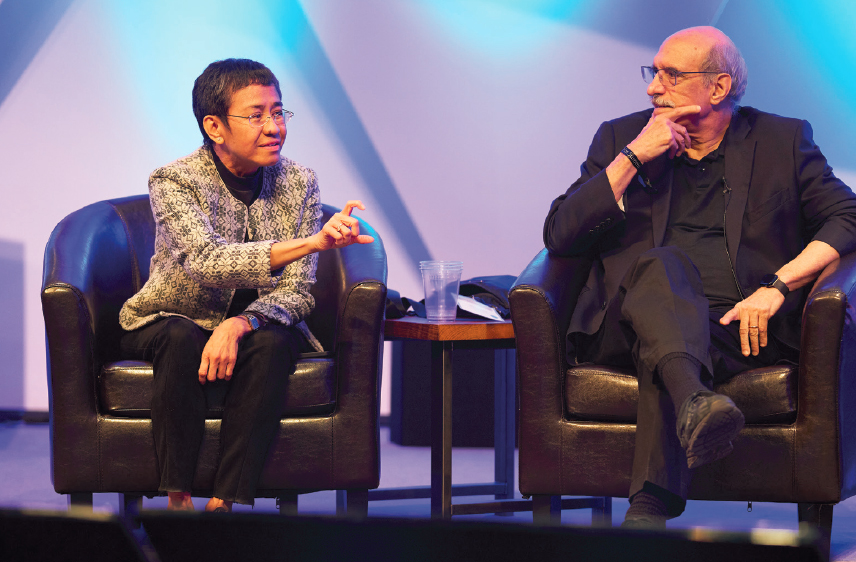
behaviors. There may be the wisdom of crowds, but mobs can also emerge that are formed by individually nice people.
Communications and engagement training should be part of the training of all scientists, the panelists said. Roberts said they must learn how to explain what they do every day, using clear language. MacMillan observed that despite advances in many areas of science, bad news “sells” faster than good news. It is important to find ways to communicate optimistic advances, too. Chalfie pointed to some efforts, such as the National Science Foundation’s requirement for grants to have an outreach component. He related a faculty search process in which candidates had to submit essays to describe not only their research and teaching but also their interaction with the broader community. He expressed the hope that public engagement would become valued for all faculty. Ressa urged scientists not to be silent.
WHAT’S NEXT
Most of the afternoon for the second day of the summit was spent in breakout sessions, as follows:
- Project Hope: The session included an introduction to the International Panel on the Information Environment (IPIE; see Chapter 4) and to promising research about how to manage the information environment. The main speakers were IPIE Scientific Panel members Wendy Hui Kyong Chun and Sebastián Valenzuela.
- Combating Health and Climate Misinformation and Disinformation: A discussion of how behavioral science can be used to develop and test solutions that can drive individual and system change in the context of health and climate misinformation. The session began with presentations, followed by small group discussions to suggest solutions.
- Hope with a Plan: The breakout included direct testimonies of the wide-ranging consequences of disinformation; discussion about companies’ business models, lack of transparency, and algorithmic amplification; and presentation of the 10-Point Plan introduced earlier by Nobel Prize laureate Maria Ressa (see Chapter 4).
- Inclusion Against Disinformation: Organized by Allliance4Europe, this session looked at how a holistic approach to driving cooperation can provide methods and tools tackling online hate and harms that serve all members of society.
BREAKOUT GROUP REPORT-OUTS
In plenary, Philip Howard (University of Oxford) shared thoughts from the Project Hope breakout, Anna Harvey (Social Science Research Council) reported on two ideas from the Health and Climate Disinformation breakout, Stephen King (Luminate) reported on the Hope with a Plan breakout, and Hallie Stern (DISARM Foundation) spoke about the Inclusion breakout. Mazurkiewicz facilitated the discussion.
Howard reported that conversation in the breakout about IPIE and Project Hope was shaped by a point made by NAS President Marcia McNutt about how science is a process and not a list of facts. Reporting on the research, he explained Project Hope was a systemic review that seems to show that flagging
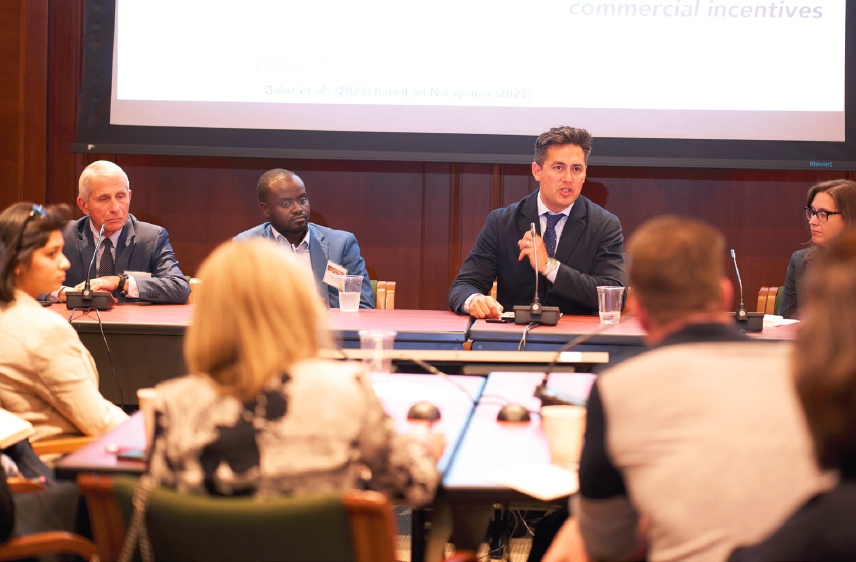
and correcting misinformation has a positive effect on learning, retention, and trust in the system. A related finding is how little evidence there is about the effect of other solutions, he noted. Of about 4,500 papers processed in a meta-analysis, a surprising number suggest solutions but do not test them. It is important to reach for models and tests that allow for stronger causal claims.
Harvey reported that each of the nine groups in the Health and Climate Disinformation breakout formulated one idea, and the group voted on the top two to share in the plenary. She observed that both ideas leverage existing resources and focus on the challenge for a layperson to distinguish between scientific consensus, valid uncertainty, and fringe opinions. The problem is when there is high consensus on a particular issue with just a few outliers, the few dissenting views are often elevated by the news media or politicians as an equivalence. The first idea draws on the U.S. Economic Experts Panel.7
___________________
7 For more information on the panel, see https://www.kentclarkcenter.org/us-economic-experts-panel.
Leading economists are regularly asked to make predictions about a range of issues and to rate their confidence in their predictions. An aggregation across experts reveals the distribution of views to nonexperts. The idea also draws on experimental evidence about the positive effect when nonexperts see a high degree of consensus on an issue. The second idea counters the negative effect of predatory, for-profit journals. This is another place where the media can create a false equivalence by reporting a paper with a fringe view was “published in a scientific journal,” even if the journal is not a highly respected one in the scientific community. An organization called NewsGuard already provides reliability ratings for media outlets, and the group suggested a similar effort to rate the credibility of scientific journals.
Stern reported that the Inclusion breakout discussed how data points affect specific marginalized communities, offline and online. Weaponization of algorithms silo people into specific networked ways of viewing the world. It is
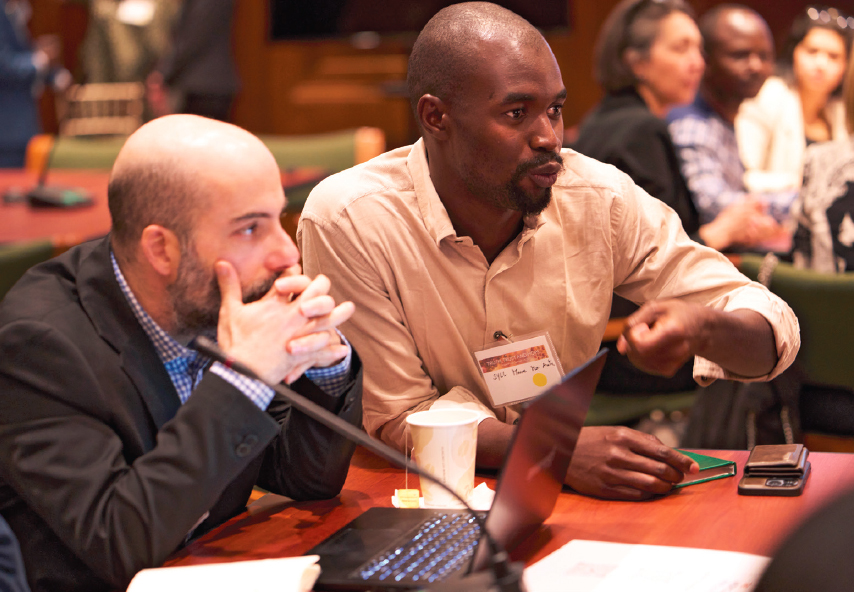
a multitiered problem, with both technical and social components. A solution suggested by the group is digital literacy catered for specific communities, encompassing media literacy, speaking to the communities, and “taking back the algorithm” for propagating appropriate information. They urged using data to rewire algorithms and identify superspreaders of disinformation before it becomes a content moderation issue. Instead of civil society, academia, and nonprofits begging for content moderation that may or may not be aligned, breakout participants suggested cohorting the people who are harming others. “Why aren’t we down-ranking the authority of superspreaders of disinformation or those who aim to harm people?” she asked. The breakout participants also recognized that there is no blanket approach or solution.
King reported that the Hope with a Plan breakout delved into the negative effects of disinformation as well as solutions. As heard through testimony, underrepresented groups and women in the Global South are the most vulnerable
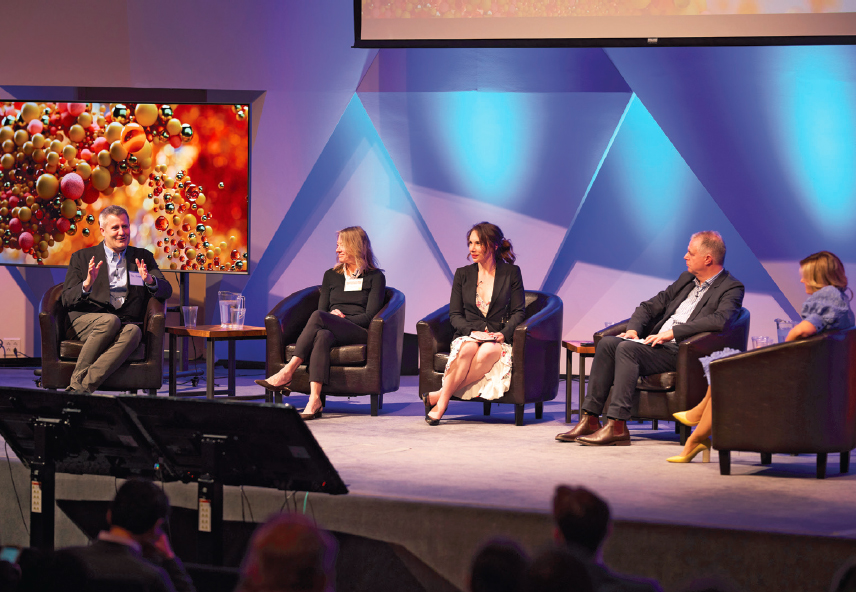
to online harms. Also, the business model of Big Tech should go beyond content moderation to recognizing and controlling “surveillance capitalism.” The group endorsed the 10-Point Plan, presented by Ressa, and urged others to sign, use, and share it.
DISCUSSION
Mazurkiewicz commented on the overlap among the solutions that participants suggested. Harvey observed that mis- and disinformation existed before, but they have been magnified, and the realization is apparent about the underinvestment in solutions. Research funding agencies should recognize the need to invest in tech solutions as well as in solutions that target decision-making behavior, she suggested. Stern suggested investments into research into the neurological aspects of why and how people respond to patterns, what creates the addiction to information, and how it harms people offline. King discussed the power of generative AI, which will supercharge how information is spread, while the
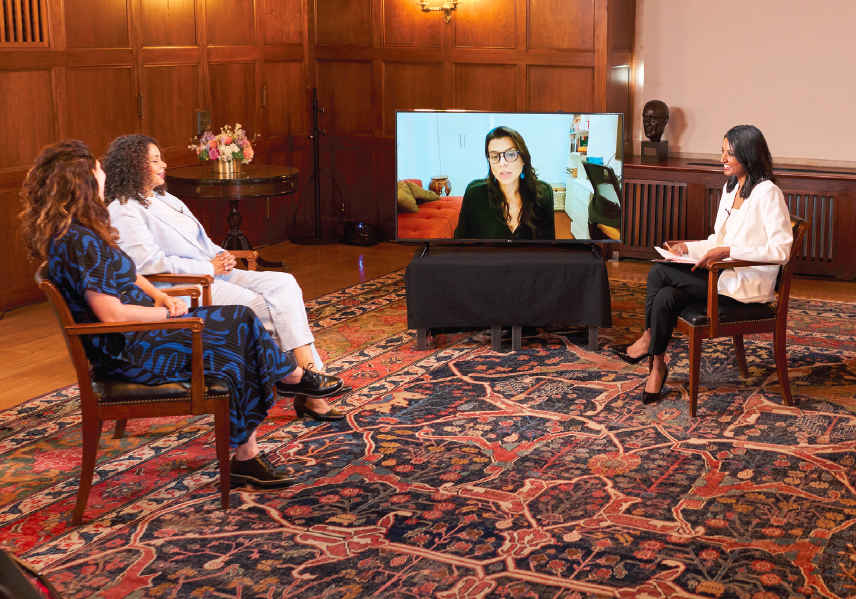
pace of legislation is slow—start now and it will be 5 to 10 years at best. Howard said he has been inspired by the shared sense of mission at the summit. Science diplomacy and communications are recognized as essential.
THE DIGITAL SESSIONS
While the breakout sessions took place in person, participants in the digital sessions heard from and participated in parallel programming, facilitated by Sumi Somaskanda (BBC News) (see Box 5-1).
DELIBERATIVE DEMOCRACY
While the breakout sessions occurred in person, a deliberative democracy polling exercise took place online. Although not binding or providing any recommendations or consensus from the summit, it served as a way to test a new model to develop a more resilient society, as explained by Åsa Wikforss (Stockholm University), James Fishkin (Stanford University), and Nobel Prize laureate Saul Perlmutter.
As context, Wikforss said an interesting research field, known as democratic innovations, has grown in recent years. It finds ways to grow participation not just in voting but also in other engagement that is essential to democracy. The Citizens’ Assembly on Electoral Reform in British Columbia, participatory budgeting in Brazil and Scotland, and climate citizens’ assemblies in the United Kingdom and France are some of the efforts. She noted that proper deliberations involve a random selection of people, expert input, and trained moderators so the deliberation is an exchange of ideas and not insults. It can serve to provide input to policymaking, and she posited that it may be used to apply to misinformation and disinformation.
Fishkin explained that the deliberative polling model requires good-sized, random samples; thus, the exercise at the summit was a demonstration of the process. It has been used in 120 projects in 50 countries as inputs to decision-making. Most recently, South Korea’s legislature commissioned a deliberative poll to receive citizen input on how to reform the electoral process. While many have been face to face, Stanford developed a technology platform to conduct the process online. The magic, according to Fishkin, is that it reduces extreme polarization and opens people to listen to the other side of an issue. They offer their conclusions in confidential questionnaires, so they have no social pressure to respond in a certain way.
Perlmutter referred to the earlier discussions about how to tell the science message better, but he also stressed the need for two-way conversation. He shared some of the comments expressed online during the exercise about whether to regulate algorithms, whether platforms should provide access to researchers, and other topics. An analysis about whether people changed their minds as a result of the polling exercise is forthcoming.
CONCLUDING REMARKS
McNutt and Helgesen offered concluding remarks. McNutt reported that they visited each breakout session and were thrilled by the ideas shared. She opined that the idea of expert panels could be combined with deliberative polling to get findings to the public quickly, and to make clear where there is consensus and where there is not. “Let the public see when there is consensus, it is because of enormous evidence, not just a whim,” she urged. She also noted that younger people (under age 33) have grown up in the era of social media and have been influenced by it as they have matured. This requires attention, she said.
Helgesen noted that several ideas from the 2021 Nobel Prize Summit have been launched, and he expressed hope that the 2023 Summit will lead to actions. “When ideas meet, innovation can take place. When people meet, action can take place. Keep the discussion going,” he stated.
























